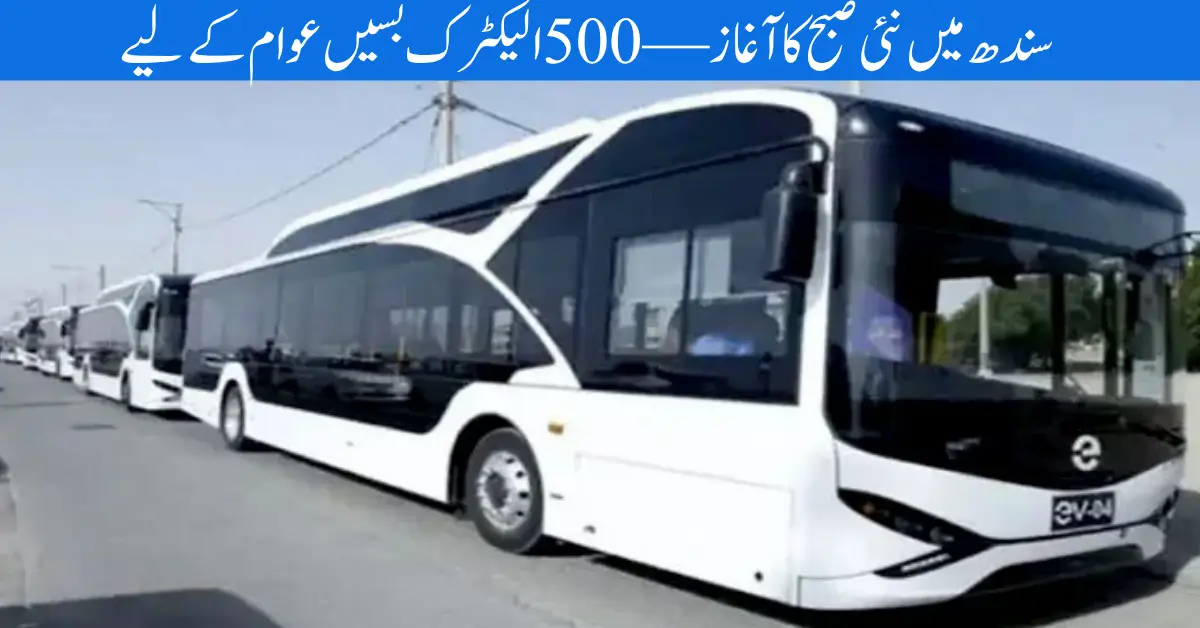Sindh electric buses
500 electric buses: Sindh is making bold strides towards a sustainable and modern future with several groundbreaking initiatives aimed at improving public transport, enhancing infrastructure, and tackling environmental challenges. A recent announcement by Senior Provincial Minister Sharjeel Memon highlights a massive leap in the region’s transportation sector, with the introduction of 500 electric buses in Karachi and Hyderabad. This move is part of the “People’s Green Transport Project,” which promises to deliver cleaner, more efficient, and cost-effective travel options for residents. But this project is just the beginning of a series of efforts designed to modernize Sindh’s infrastructure and improve the quality of life for its citizens.
The People’s Green Transport Project: A Game-Changer for Sindh’s Public Transport
One of the most ambitious initiatives in Sindh’s transport sector is the introduction of 500 electric buses across Karachi and Hyderabad. The People’s Green Transport Project aims to provide citizens with a clean, affordable, and eco-friendly alternative to the city’s existing public transport system, which has long been plagued by overcrowding, pollution, and inefficiency.
The phased rollout of these electric buses is expected to offer a comfortable and convenient travel experience for residents, with modern amenities on board. But the biggest advantage of these electric buses is their environmental impact. By reducing reliance on fossil fuels and lowering emissions, this project is poised to significantly reduce air pollution, contributing to a healthier urban environment.
DGIP Passport Tracking 2025: Step-by-Step Guide to Check Application Status Online & via SMS
Modern Infrastructure to Support the Electric Bus Fleet
For any public transport system to be effective, a solid infrastructure is crucial. To support the electric buses, the Sindh government is planning the construction of state-of-the-art bus depots, charging stations, and automated fare collection systems. This modern infrastructure will ensure that buses are regularly maintained, passengers can easily pay fares, and buses are charged efficiently to operate throughout the day.
Additionally, the introduction of smart monitoring systems will make the entire bus network more streamlined and responsive. These technologies will help monitor bus locations in real-time, improve scheduling, and allow passengers to track bus arrivals, making the travel experience more user-friendly and efficient.
The Karachi Port to Qayyumabad Elevated Expressway: Easing Traffic Congestion
While the electric buses are set to revolutionize urban transport, the Sindh government is also tackling traffic congestion on another front by approving the Karachi Port to Qayyumabad Elevated Expressway. This 16.5-kilometer-long freight expressway is designed to create a dedicated route for heavy vehicles, including cargo trucks and shipping containers, between Karachi’s bustling port and other key locations.
This project is essential for several reasons. By creating a separate route for freight traffic, the expressway will ease pressure on the city’s urban roads, reducing congestion and travel time for both passengers and goods. Furthermore, it will enhance the efficiency of Karachi’s port operations, making it easier and faster to transport goods in and out of the city.
Government Moves to Avoid Rs220 Billion Interest Burden on Chinese Power Plants
Environmental Focus: Riverine Forests in Jamshoro and Matiari
The Sindh government is also committed to protecting the environment with a major reforestation initiative. The plan to plant riverine forests across an area of 41,000 acres in Jamshoro and Matiari represents a bold step towards environmental conservation and carbon emission reduction. Riverine forests are crucial for maintaining biodiversity, improving soil quality, and regulating water cycles.
These forests will not only help in combating climate change but also provide valuable green spaces for local communities and wildlife. By engaging in such projects, Sindh is laying the foundation for a more sustainable future for both urban and rural areas.
Boosting Agriculture with Modern Technology
Beyond transport and environmental protection, the Sindh government is also focused on boosting the province’s agricultural sector. The government has set its sights on using modern agricultural technologies to increase efficiency and productivity. A key component of this effort is the Public-Private Partnership (PPP) model, which encourages collaboration between the government and the private sector.
Two major projects exemplify this push towards modernization in agriculture. First, the Tomato Cluster Processing Plant in Thatta will boost local tomato production by facilitating better storage, processing, and distribution. Second, the mechanization of rice and wheat farming across the province will help farmers increase crop yields while reducing manual labor. Both projects are designed to make agriculture more sustainable and profitable for local farmers.
Benazir Kafalat Payment 2025: Check Rs. 13,500 Status and Withdraw Funds Easily
Public-Private Partnerships: Driving Urban Development and Employment
The Public Private Partnership (PPP) model is central to many of these projects. By collaborating with private enterprises, the government is able to tap into expertise, technology, and investment that it might not have access to otherwise. The PPP projects in Sindh are not only improving infrastructure but also creating job opportunities, driving investment, and fostering innovation in key sectors like transport, energy, and agriculture.
These partnerships are transforming Sindh into a modern, tech-driven region. As more projects come to fruition, the benefits will be felt across urban and rural areas alike, with improved facilities, better public services, and greater economic opportunities.
A Greener, Smarter Future for Sindh
The initiatives launched by Senior Provincial Minister Sharjeel Memon and the Sindh government are laying the groundwork for a greener, more prosperous future for the people of Sindh. From the electric buses in Karachi and Hyderabad to the elevated expressway and reforestation efforts, each project is a step toward building a more sustainable and efficient infrastructure.
The focus on Public Private Partnerships, technological innovation, and environmental conservation reflects the Sindh government’s commitment to creating a modern, forward-thinking province. As these initiatives take shape, the people of Sindh can look forward to a future that is not only more comfortable and convenient but also more environmentally responsible.
By integrating clean energy into the transport system, enhancing agricultural practices, and improving urban infrastructure, Sindh is positioning itself as a model for sustainable development in Pakistan. This holistic approach will improve the quality of life for residents, boost the economy, and contribute to a greener, smarter, and more connected future.
Pakistan Govt Announces LNG Flat Rate Scheme to Ease Energy Burden on Families

